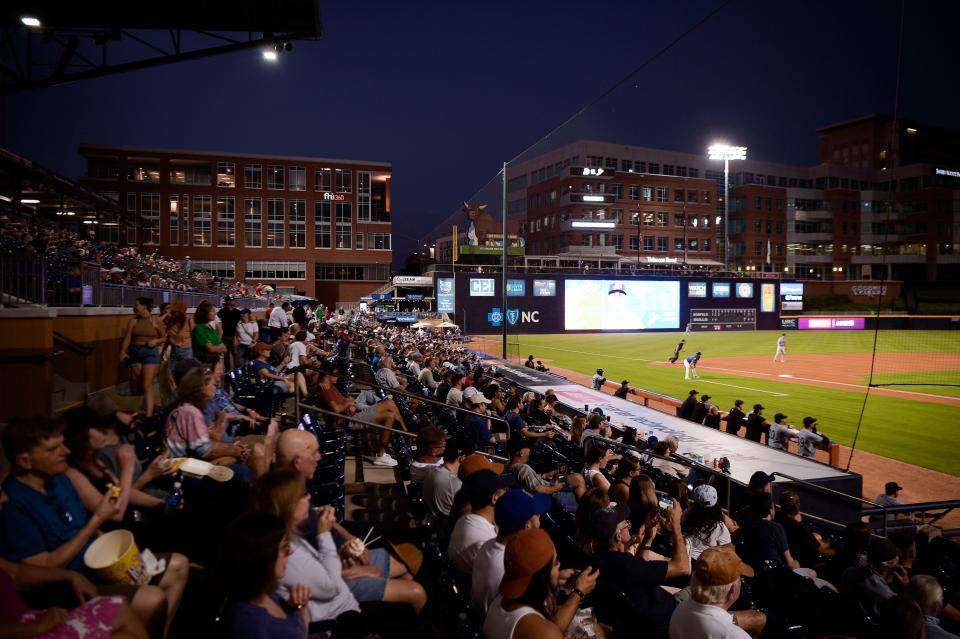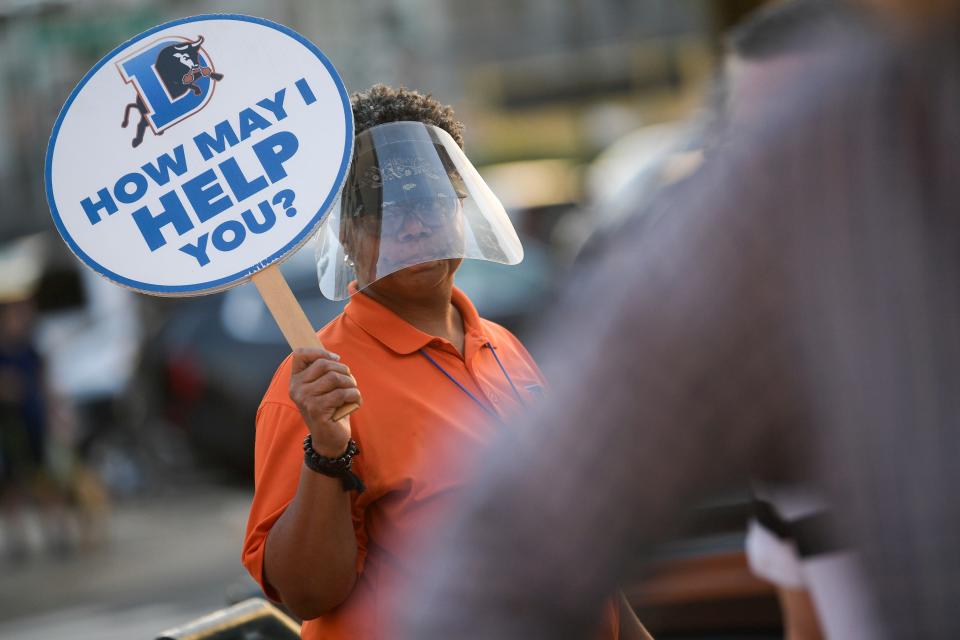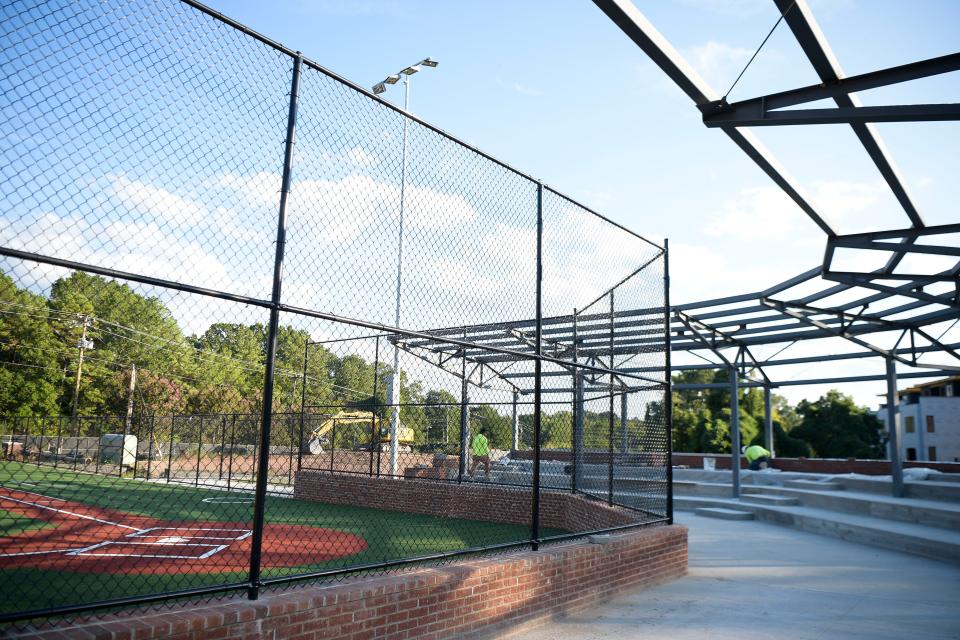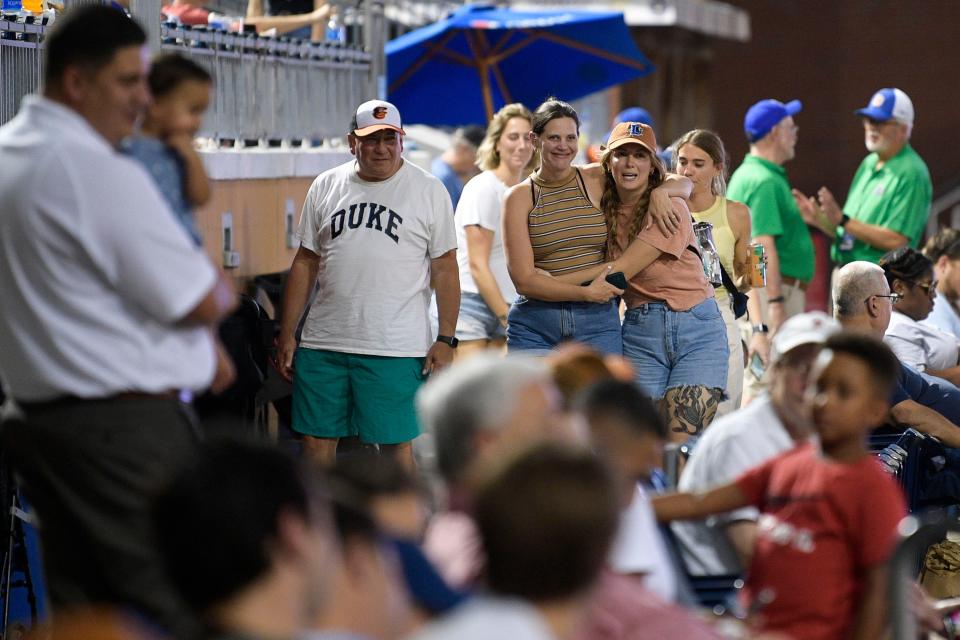Can Smokies stadium fulfill Randy Boyd's promises? The 'proof's in the pudding' for Durham
- Oops!Something went wrong.Please try again later.
If 1990s residents of Durham, North Carolina, had it their way, a downtown stadium in the city's abandoned warehouse district never would have happened.

They voted against the idea, but the city moved ahead regardless, betting big on a new minor league baseball stadium's ability to revitalize a mostly deserted downtown once prosperous in the tobacco industry.
Today, with community members from diverse backgrounds hosting and attending events in and around the ballpark, it’s hard to find someone who could imagine downtown Durham without Durham Bulls Athletic Park, which is approaching its 30-year anniversary.
Thirty years is the same length of time as Randy Boyd's lease for his Double-A Tennessee Smokies team to play baseball at a new downtown Knoxville stadium currently under construction.
During that time, stakeholders forecast public investment will be repaid and development will flourish around the site in the Magnolia Warehouse district just east of the Old City.
Public funding already has been approved for the stadium, though a final price for the structure has not been determined. The previous estimate of $80.1 million likely will increase due to unpredictable construction costs, and Boyd has promised to loan up to $20 million to cover the difference.
That loan would be repaid through an expanded tax increment financing district, but Boyd would be personally responsible for any costs that go over the final estimate, which should be determined this winter.
With Knoxville’s stadium scheduled to open for the 2025 season, Knox News visited Durham to meet with representatives of the Triple-A Bulls team and other local leaders to learn if a downtown ballpark can become a community asset and begin to revitalize portions of a city’s core.
“The proof’s in the pudding,” said Scott Strickland, assistant general manager of operations for the Durham Bulls. “And so, to a degree, I would say to the naysayers of the stadium in Knoxville: Walk down there five or six years after it opens and think to yourself, ‘Was this a good idea, or was it not a good idea?’
“I guarantee you will say this was a doggone good idea and, more importantly, is worth the investment.”
A brief history of how Durham did it
So what did we learn? Stakeholders, from former city officials to the Greater Durham Chamber of Commerce, said transformation does not happen overnight.
The Durham Bulls team, owned by Capitol Broadcasting Company, opened its new ballpark in 1995 after moving from its much-smaller downtown stadium that movie buffs might recognize from the 1988 “Bull Durham" film.
Downtown was a ghost town when the move happened, and the game-day experience was: parking, walking to the stadium and leaving when the game was over. Downtown had nothing else - shops, restaurants or nightlife - to offer.
It wasn’t until 2004 - nine years later - that the neighboring American Tobacco Campus that once manufactured Lucky Strike cigarettes was reopened as a multiuse campus with offices, restaurants, event space and a diverse business community.
Tennessee Smokies team owner Randy Boyd has made a lot of promises related to what's coming to Knoxville beyond just the stadium.
With at least $130 million of investment, Boyd will build a condo building with first-floor commercial space and will set the stage for an apartment building to be built in the vicinity.
This figure does not account for a SpringHill Suites by Marriott that Turkey Creek Hospitality is planning nearby or additional investment expected to follow the stadium from an array of private developers.
But perhaps the biggest promise Boyd has made is the stadium will become “the people’s park” – somewhere all Knoxvillians can gather for games and other community events.
The Durham park adopted a similar ambition and has so far been successful.
Event organizers want to use the stadium
Marcus Manning, executive director of the Durham Sports Commission, told Knox News the ballpark hosted 261 events in 2019. Just 70 of those events were home games, and 99 happened in the offseason.
Strickland, however, said the team actually is planning to scale back that number.

"That 261 number puts a lot of stress on our core events full-time staff and to the facility itself," he said via email. "We’ve gone from really not hosting any events outside (of) baseball games, to 'Hey let's build a special event aspect to our business and we’ll host anything and everything,' to 'Wait a second, we’re killing our staff and not seeing the output meeting the input.'"
Moving forward, the team will focus more on hosting between three and four concert events per year, each of which could attract up to 5,000 spectators, instead of dozens of 50-person lunches "that simply do not move the needle," he said.
Boyd has similar ambitions to what's already happening in Durham. A 2021 economic impact report for the forthcoming stadium projects the facility could host 208 events, including 69 home games, 100 private rentals, 22 ticketed events and 17 home matches for the recently established One Knoxville SC.
Over the years, Durham’s events have ranged quite literally from funerals to weddings. During Knox News’ visit to the stadium, the local Rotary Club was hosting a gathering in the PNC Triangle Club, an event space the team created by combining multiple suites after realizing the value of its one-of-a-kind real estate.
Prior to that club, the Durham stadium could not host groups larger than 25 people.
“The bulk of (the business) still is the baseball side, but I think that’s kind of an area of growth that we’re looking forward to,” said Mike Birling, the Bulls’ vice president of operations. “We were shocked at how many people came to that concert in June that had never been to this ballpark. …
"It just brings in different people from not only Durham but (the region) for different events.”
Stadium opportunities for all types
The only time the park is “shut down” is the last couple weeks of December and the first couple weeks of January, Birling said. Throughout the year, the park welcomes health fairs for low-income neighborhoods, school graduations and interns looking to get their foot in the door.
Some of those internships are in partnership with North Carolina Central University, a historically Black college.
“We have an intern that’s sitting two floors below us right now who is amazing at drawing,” Strickland said. “The number of things that she has drawn to help advertise the Bulls is amazing. And that is someone who, I guarantee, a year ago she did know that the Durham Bulls had a job that would be a home for her. And poof. … And so, that’s an African American female who’s now potentially thinking about working in sports.”
As part of Knoxville’s stadium development, Boyd is partnering with the Knoxville Area Urban League’s workforce and entrepreneurship programs to give minority and disadvantaged business owners the tools to participate in the stadium’s construction – and in the job opportunities that follow its opening.
The Knoxville Sports Authority Board also has an internship board whose goal is to provide opportunities for minority interns to get involved with the board’s operations and to “create a pipeline of minority professionals through internship experiences,” according to September 2021 meeting minutes.
Stadium staffing that reflects the community
The historic disinvestment in Knoxville’s Black community has kept residents skeptical of just how involved people of color will be in the project, but Durham Bulls executives shared insight as to why it's advantageous for a minor league baseball team to have diverse voices at the table.
“You want (stadium workers) to be a reflection of your community,” Strickland said. “If you’ve got someone who’s feeling a little doubtful of whether or not they want to go to ... the (stadium) or this restaurant or whatever, and you just round that corner and you see a smiling face that comes from your neighborhood, that’s going to make you just naturally feel much more welcomed at that facility.”

The Bulls’ HR staff views its hiring process as community outreach, he said, connecting with local civic groups to make sure a diverse portion of Durham is aware of the job opportunities.
“You can also go as far on the macro as you possibly want to go, and a company is not going to be successful unless you’re serving everyone in your community,” Strickland said. “It’s a simple sentence. … You’re at least not going to be as successful as you could be.”
The Bulls have roughly 45 full-time employees, with seasonal staffing “well over 400,” Birling said. A substantial portion of seasonal workers are staying on longer than usual, as the Bulls continue to explore the events side of their business.
Stadium opens up youth opportunities
While much of Knoxville’s focus has been on internship and workforce training, Boyd and his GEM Community Development Group also have pledged investment toward youth baseball. That includes a $1.6 million makeover of Claude Walker Park near Austin-East Magnet High School.

Part of that investment goes toward costs related to uniforms, equipment and operations.
The Durham Bulls have been incredibly successful in their youth outreach efforts, providing a totally free baseball league that supports more than 500 children between ages 5 and 12 – uniforms and equipment included.
While skepticism might surround this similar effort in Knoxville, Birling assured Knox News this type of outreach is beneficial to all parties.
“If every kid in downtown Durham from the minute they're 5, 6 years old and pick up a glove and bat know that the Durham Bulls were the ones that got me this … yeah, selfishly, that’s not why we do it,” he said. “But there’s absolutely impacts on us. … Our goal is to definitely help the community. But, if there’s a selfish piece to it, we’re trying to create Bulls fans that are going to be coming here for long after I’m gone.”
Some things you 'just can't get' with other venues

It's no secret that African Americans are not a major demographic when it comes to interest in baseball. A study by the Society for American Baseball Research found the rate of African American players in the major leagues has been steadily declining since the 1980s. In 2016, the demographic accounted for just 6.7% of all players, the lowest percentage since 1957.
But Birling, just like Boyd, still believes baseball can be an affordable activity all communities can enjoy.
“A lot of people don’t like baseball or they think they don’t like baseball because it takes too long,” Birling said. “I look at it as completely opposite. This is one of the few sports where you can sit and actually have a conversation with your neighbor, have a conversation with one of your employees. …
“You can sit here; you can relax. And you just can’t get that with other venues.”
This article originally appeared on Knoxville News Sentinel: Can Smokies stadium change Knoxville like Bulls park changed Durham?

